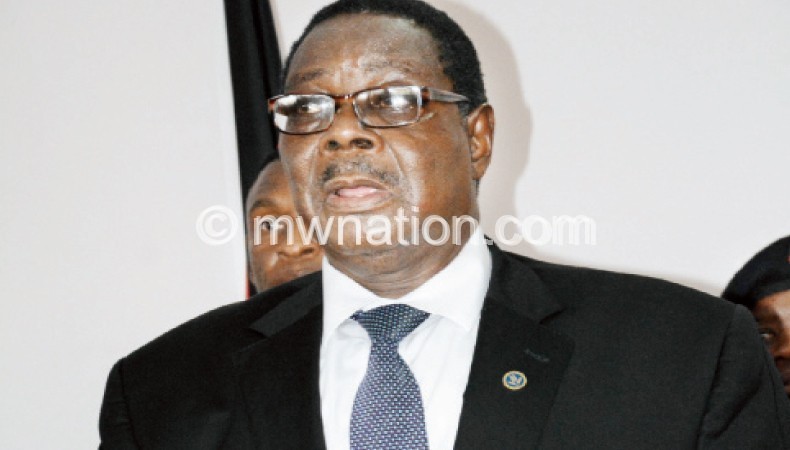Peter’s cabinet to save K1.1bn
If President Peter Mutharika maintains a 20-member Cabinet throughout his five-year term as promised, he will be saving taxpayers over K1.1 billion (about $2.6m) in pay packages alone, a Nation on Sunday comparative analysis shows.
The analysis—based on the current levels of pay packages for ministers and deputy ministers—shows that from now onwards government will be saving K20.2 million (about $50 500) monthly with 20 ministers compared to former president Joyce Banda’s last Cabinet of 32.

A former Cabinet minister, who spoke on condition of anonymity, disclosed last week that a full Cabinet minister pockets K1.3 million (about $3 250) in monthly salary and a K520 000 (about $1 300) monthly fuel allocation while a deputy Cabinet minister takes home K800 000 (about $2 000) salary and K520 000 for fuel.
Based on these figures, we calculate that president Banda’s Cabinet was costing a minimum of roughly K55.2 million a month in packages or K662.4 million per year whereas Mutharika’s will cost K35.4 million monthly or K424.8 million annually.
Over five years, Banda’s Cabinet would have swallowed K3.3 billion while Mutharika’s is projected to cost K2.2 billion, which creates a saving of K1.1 billion.
Compared to his brother Bingu wa Mutharika’s 43-strong Cabinet in 2010 before it was later slightly reduced, it would have cost Treasury K3.8 billion over five years, making Peter’s savings even higher at K1.6 billion.
The K1.1 billion is a very conservative estimate because it does not include local and internal travel allowances and fuel expenses for the ministers, which many analysts say are a huge drain on the public purse.
The K20.2 million current monthly Cabinet savings is enough to fund administrative operations of major referral Queen Elizabeth Central Hospital (QECH), Kamuzu Central Hospital (KCH), Mzuzu Central Hospital and Zomba Central Hospital for two years at a time the administration of Banda was poorly funding the public hospitals.
The hospitals mentioned above were getting an average monthly funding of K100 000 for day-to-day operations, which government was also releasing with delays, at times even reducing it to as low at K50 000, thereby affecting operations.
The Office of the President and Cabinet (OPC), which manages Cabinet ministers’ perks, could not respond to a questionnaire sent on Tuesday through its spokesperson Arthur Chipenda to confirm the current perks, to clarify if there was any change and to provide a breakdown of other benefits Cabinet ministers get.
Observers have received the savings news with mixed feelings.
Malawi Health Equity Network (Mhen) executive director Martha Kwataine said in an interview on Friday that the K20.2 million monthly savings is significant as long as such savings go into budget items for social services or building infrastructures and other development initiatives.
Kwataine said other government departments were poorly funded; hence, such savings would mean a lot.
She hoped that such lean Cabinet will be embraced by future governments.
Kwataine further suggested: “We wish this can be maintained. This is something that just has to be made into law, restricting a president to appoint a Cabinet of not more than 20—including Cabinet ministers, deputies, the president and vice-president.”
But she said the trimming must be extended to principal secretaries (PSs) because it would not make sense to have 67 technical heads of ministries as is currently the case when there are only 20 political heads.
“We had such a huge number of PSs because most of them were appointed just to appease them. Government must retire those that reached retirement age and work out how to handle the rest.
“We can have deputy PSs in key ministries only such as Health, Education and Agriculture. The newly appointed Civil Service and Public Service Reform Commission should look into this matter,” said Kwataine.
But associate professor of law at the University of Malawi’s Chancellor College Garton Kamchedzera said the issue was not about numbers.
Rather, he said, a well- structured government with a minimum number of ministries that can attain efficient and effective delivery of government services is what matters.
On suggestions that the number of Cabinet posts be legislated, Kamchezera said coming up with such a law would require clear analysis and demonstration of why the nation would require that figure based on national needs.
He said such an exercise would also require regulating the number of presidential advisors, arguing Cabinet ministers are in fact advisers to the President.
Kamchedzera said: “Mostly, a President appoints presidential advisers from his or her political parties just for appeasement.
“These people are also a drain on public resources. When we are talking of limiting ministerial appointments, we should also be talking of limiting presidential advisers. We need clear guidelines as to how many advisers a president must have. My personal opinion, though, is that we don’t need such advisers when we have ministers that play the advisery role to the President.”






APM you have already started scoring. Let the caravan keep on moving dont be scared of the dogs that are barking along the road, I mean the jessies.
APM you have already started scoring. Let the caravan keep on moving dont be scared of the dogs that are barking along the road, I mean the jessies.
How much in real terms will the saving be, considering those who are MPS would also have been paid around 700,000 Mk anyway. Is this fact, factored in the calculations?